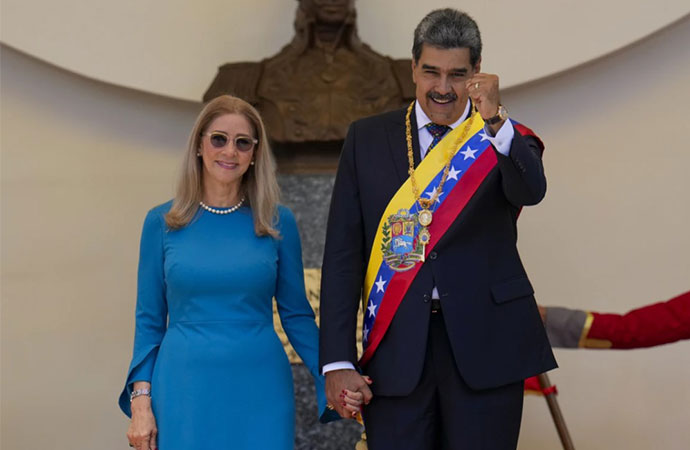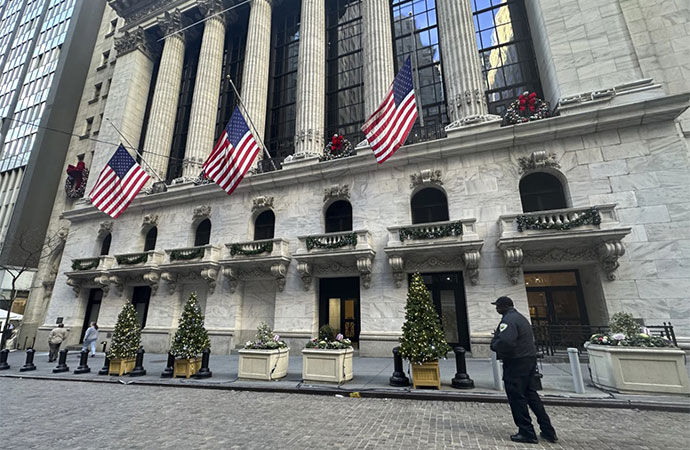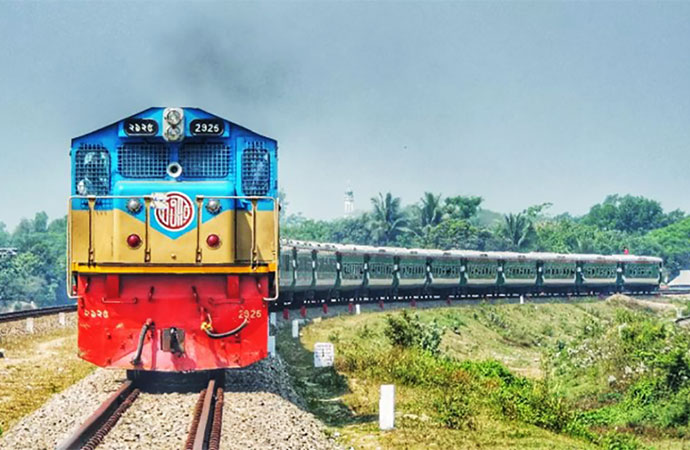Column

Venezuelan President Nicolas Maduro and his wife Cilia Flores stand at the National Assembly after his swearing-in ceremony for a third term in Caracas, Venezuela, Friday, Jan. 10,2025. Photo: AP/UNB
Maduro took office last week for a third consecutive term. Now, he’s consolidating his position as dictator
Nicolás Maduro has now been in power in Venezuela since 2013 - gradually usurping power over the past twelve years until becoming a full dictator. But how did we get here? The answer is: A process of election fraud, crackdown on any opposition, deep state militarisation and wider human rights abuses. It's meant that the Venezuelan people have suffered incredibly - and likely will continue to suffer as he begins yet another term this week.
Maduro first became president on an interim basis in 2013, after the death of Hugo Chávez, who had designated him as his successor. That same year, he narrowly won a special election, denounced by the opposition and many commentators. The opposition candidate Henrique Capriles at the time faced relentless persecution by the government after asking for a full review of the results - a case which he took to the Inter American Court of Human Rights and won last December (eleven years on).
But here's how Maduro continued to entrench his power further over the years. In the 2015 parliamentary elections, the opposition won a majority in the Legislative Assembly, but Maduro's government refused to recognise it and stripped it of its legislative powers, creating an ad-hoc body controlled by the ruling party.
Maduro was re-elected in 2018, in elections that the UN High Commissioner for Human Rights, the Organisation of American States, the European Union and several Latin American countries all considered lacking in transparency and legitimacy.
In 2020, Maduro's government held parliamentary elections, but the opposition decided not to take part in them stating that there were no guarantees of a fair process.
Maduro went one further in the latest elections in July 2024. He proclaimed himself the winner without the electoral authority publishing the voting tallies that should certify the results. Last week, he began a new mandate that will end in 2031.
The Venezuelan crossroads raises a crucial question: is it possible to defeat a dictator when he has the support of the armed forces? Maduro has continued what his predecessor Chávez started - a process of deep militarisation - with the Bolivarian National Armed Forces expanding their area of influence beyond territorial defence.
There are now 44 companies in the hands of the military, in fields as varied as agriculture, mining and gas, banking, manufacturing, construction and textiles, among others, according to the pro-transparency civilian organisation Control Ciudadano.
Meanwhile, Venezuela has more generals in its army than any other country in the world - senior army figures that are aligned with Maduro's political and economic vision. Some analysts have suggested that Maduro himself has put in place 2,000 loyal generals - a number greater than that of any NATO member country. The US, for example, has fewer than 900. Furthermore, defence minister general Vladimir Padrino has repeatedly assured Maduro of the military's support.
In response to former Colombian president Álvaro Uribe's call for a military intervention force in Venezuela under the umbrella of the United Nations, Maduro warned that he would act with the necessary military violence, supported by joint Cuban and Nicaraguan forces. An intervention in Venezuela not only does not guarantee effectiveness, it could be disastrous, as well as illegitimate under international law. The way out is not through violence.
How to overthrow a dictator
Could the international community bring about change? Indeed, it's tried to speak out in various forms. The Inter-American Commission on Human Rights concluded that Maduro's latest re-election lacked "democratic legitimacy", highlighting the regime's repressive practices, including arbitrary detention of political leaders and human rights advocates, intimidation to opposition and voter fraud.
The Carter Center was unable to verify the results of the July presidential election because it was not given access to the voting records, and accused the government of violating electoral rules. The UN panel of electoral experts concluded its mission to Venezuela in August 2024 and delivered an interim report to Secretary-General António Guterres in which it said it could not confirm Maduro's victory.
The US froze assets and visas to around 2,000 high ranking officials, including Maduro himself. It also increased rewards for the surrender of Maduro, Interior minister Diosdado Cabello and Padrino. The Council of the European Union extended its list of sanctions against senior Venezuelan officials on 10 January 2025. Britain, Canada and Chile joined the condemnations, sanctions and visa restrictions on Venezuelan individuals aligned with Nicolás Maduro.
In November 2021, Venezuela became the first Latin American country to be formally investigated by the International Criminal Court (ICC) for human rights abuses. Maduro had an appeal to the ICC, seeking to halt investigations against him for possible crimes against humanity, dismissed. The investigation remains open.
The Biden administration sanctioned 16 Venezuelan officials, but refrained from furthering sanctions against the oil sector. Washington has been very cautious about touching the licences held by the US company Chevron which has a longstanding presence in Venezuela. It fears that if Chevron was to completely retreat from the country, the Chinese or Russians could take its place, engaging in a further presence in the country and region - which is of course not in the US's strategic interest.
The US and Venezuela did reach an agreement in Qatar in September 2023 that included the lifting of sanctions and the normalisation of diplomatic relations in exchange for the following year's presidential elections being competitive and allowing the opposition to participate. In reality however, there was a partial ease of sanctions for several months - and then the Maduro government did what it always does - it refused to comply and did not honour its commitment to fair elections.
Opposition negotiation with the regime, which is the most civilised method, has also not worked in its various forms over the years. The latest iteration in Barbados which was meant to set the stage for the elections last year, was totally ignored by Maduro's government.
Civil resistance might be an appropriate avenue. Actions such as road blockades and closures, human barricades, multiplying marches, transgressing rules and directions, disregarding regulations, denouncing the situation in independent media, feigning loyalty, increasing opposition unity, undermining institutions addicted to the regime, spreading the voice of disenchanted marginalised people, and appealing to denouncing graffiti, leaflets or consumer boycotts to the country's products, could be measures that achieve effects.
But we have to remain conscious that the cost of these attempts will always fall on the already suffering Venezuelan population - where nearly 83% live in poverty and a third of the population have fled the country. Indeed, data from the NGO Foro Penal show an increase in repression since the elections. From 29 July to 8 August, 1,229 arrests of opponents were verified by the legal organisation Foro Penal.
That said, there are signs that the public are willing to stand up, as the opposition candidate Edmundo González Urrutia obtained 67% of the vote last July - according to tally sheets collected and released by the opposition.
Opposition leader María Corina Machado, González Urrutia and millions of Venezuelans need clear and forceful support from the international community, and especially from Latin American countries.
Several Latin American presidents have said they do not recognise Maduro as president-elect. After the elections, Venezuela severed diplomatic relations with Argentina, Chile, Costa Rica, Panama, Peru, the Dominican Republic, Uruguay and Paraguay. But these lukewarm responses are not enough as countries and leaders have acted individually and have not structured a joint action that emphasises the consequences that Venezuela's government can have on the region.
Presidents Gustavo Petro (Colombia), Gabriel Boric (Chile), Luis Lacalle Pou (Uruguay), Javier Milei (Argentina), Daniel Noboa (Ecuador), Luis Arce (Bolivia), Luiz Inácio Lula da Silva (Brazil) and Claudia Sheinbaum (Mexico) must unhesitatingly support the real election results in a united and bold manner.
After all, the fall of the Venezuelan dictatorship could impact the entire region. It may augur the fall of the Cuban and Nicaraguan regimes, given their mutual reliance on oil, intelligence and support. It would mean a strengthening democracy in a region of the world where authoritarianism is flourishing. For the sake of the millions of Venezuelans suffering, it is worth a try.
From openDemocracy

























Leave a Comment
Recent Posts
The forensic clean up of the f ...
Much of the coverage centring the surge in Non Performing Loans (NPLs) ...
Hong Kong’s deadliest fire in ...
Hong Kong’s deadliest fire in decades left at least 44 people de ...
False document submission hurts genuine students’ ch ..
The Missing Ingredients for Peace in Palestine
Songs of Hyacinth Boats & Hands: Reading Conversatio ..
Executive Editor Julie Pace on why AP is standing fo ..